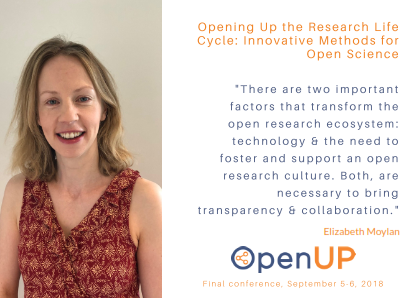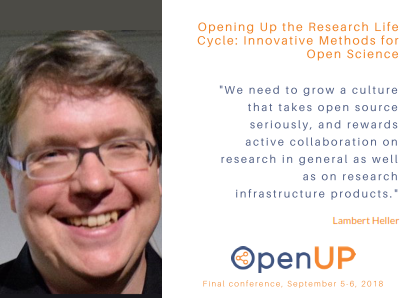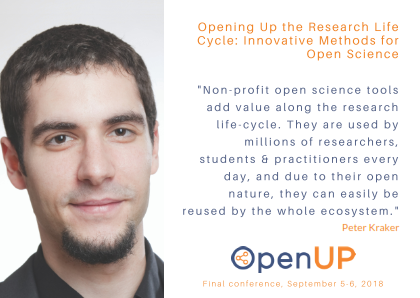Motivate and Meet: Online tools and platforms
OpenUP Final Conference Session 3: Motivate and Meet: Online tools and platforms
Elisabeth Moylan - Wiley
“Many research communities are participating in a growing drive to more openness, whether that be in terms of open science and open research, open collaboration, open data, open access to published research, openness in the peer review and publishing process and open recognition for the work done.
These initiatives have a positive influence by introducing more transparency and accountability to the research, peer review and publishing processes.
Of course technology – the use of online tools and platforms - is transforming every step of the research lifecycle, from how research is enabled, conducted, shared and published. But technology is just one aspect impacting on the open research ecosystem, the other aspect is the need to foster and support an open research culture itself. These are exciting times and there is a real opportunity for all those involved in the research lifecycle - funders, researchers, institutions, publishers - to adopt a collaborative approach to bring about increased transparency and openness.”

Lambert Heller - TIB
“The goal of allowing many and diverse people to engage with the process and the results of science is facing a major road barrier with archaic, non-scientific standards of research dissemination and research assessment today. Research results are expected to come mainly as stories that tell about a successfully finished research project, which is an unnecessarily limiting expectation. This anachronistic practice is enforced by misusing publisher and journal brand names as proxies to assess research results. All of this willfully ignores what is possible in today’s environment: The research process uses digital raw data, software, versioning systems, digital writing tools etc. anyway, from the start. Though data and software is still often only recognized as an appendix to the paper. Same with peer review – it can do much better than being applied behind closed doors. Research assessment could be more transparent and more efficient if it recognized widespread practices like preprints and open peer review. Last but not least, our digital tools and platforms are far too important for research to leave them to the control of a few big legacy publishers, or respectively, big tech companies like Microsoft or Google. Although today they all commit to the goal of openness (because otherwise no government money), their business goals are ultimately to satisfy shareholders. On many levels, this turns out as not well aligned with the goal of opening science – and therefore we should be very careful with allowing those players taking on key roles. Instead, we need to grow a culture that takes open source seriously, and that rewards active collaboration on research as well as on research infrastructure products. Research libraries are of course not the only institutions ready to support and grow such practices, but as an academic librarian, I tend to think we’re well positioned for that. I think many libraries already recognized that it’s not only a unique opportunity, but also a serious obligation to grow our roles in the cultural change of research and research infrastructure.”

Peter Kraker - Open Knowledge Maps
Non-profit open science tools add value along the research life-cycle. They are used by millions of researchers, students and practitioners every day, and due to their open nature, they can easily be reused by the whole ecosystem. However, there is a distinct lack of funding for these tools, making it difficult to develop them in a sustainable way. We are thus risking their disappearance, leaving everyone poorer for it."




